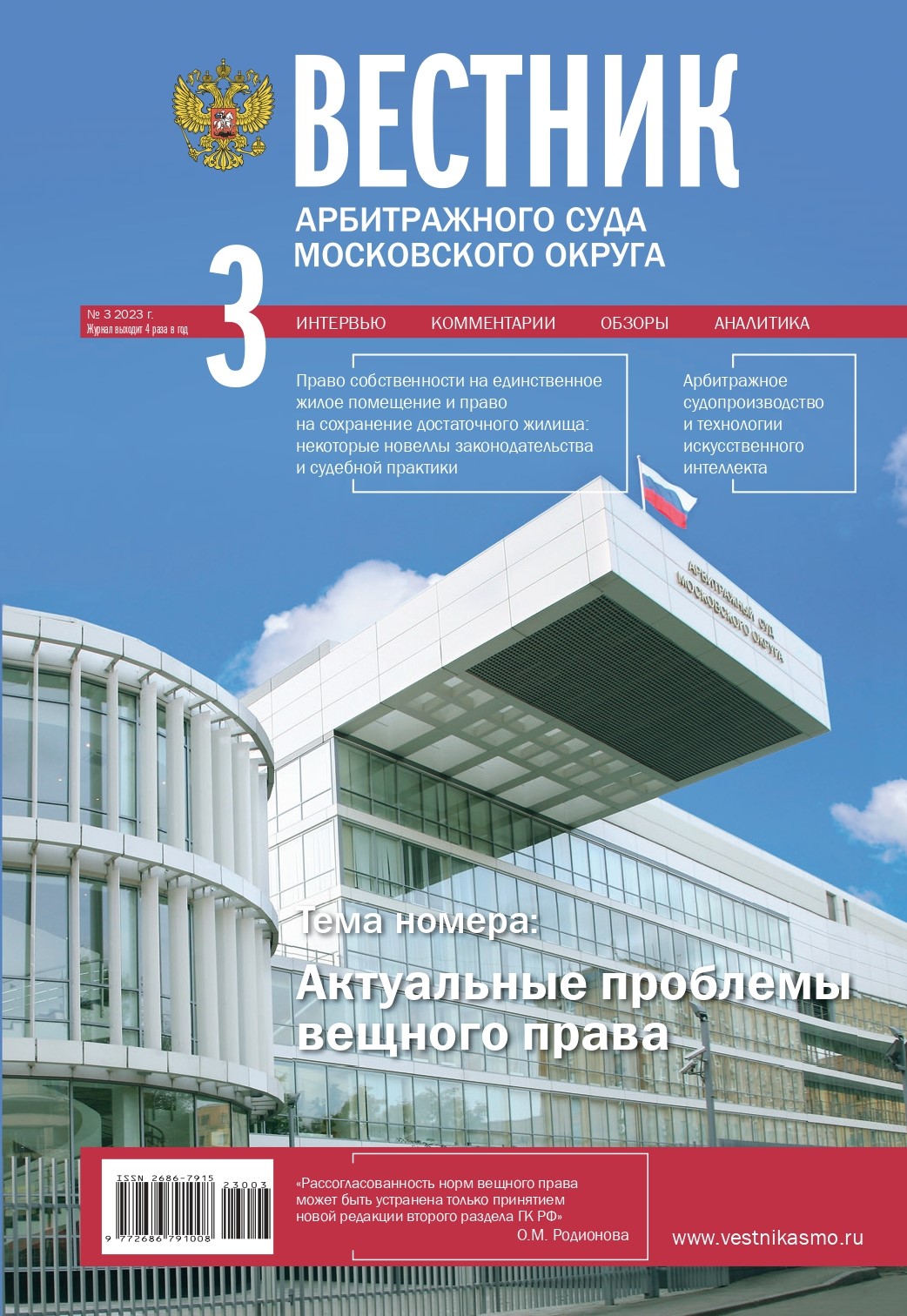Courts News
News of Moscow District Courts
Interview of the issue
O.M. Rodionova. The inconsistency of proprietary law norms can be eliminated only by adopting a new edition of the second section of the Civil Code of the Russian Federation
Topicality
Qualification of a real thing as movable or immovable for the purpose of determining the period of acquisition limitation
Analytics: Current problems of property law
M.V. Bando The Right to Ownership of the Only Living Premises and the Right to Retain Adequate Housing: Some Novelties of Legislation and Judicial Practice
The article is devoted to the analysis of current court practice and legislative novelties concerning the right of ownership of the only residential premises. The author develops the idea of the presence in the content of the ownership right of a special material subjective right to preserve a sufficient dwelling, which enjoys special protection and serves as a basis for various procedural forms. The article touches upon such topical issues related to the only dwelling as the possibility of foreclosure outside bankruptcy proceedings, attribution of unfinished construction objects to the objects of the right to preserve adequate housing, peculiarities of challenging transactions on alienation of residential premises in bankruptcy cases, if such residential premises are the only one for the purchaser. The article separately discusses in sufficient detail the correlation of the rights of pledgees to the value of the only residential premises with the rights of other creditors, as well as the problem of deprivation of the right to substitute residential premises of an unscrupulous debtor and members of his family.
Keywords: right to housing; ownership of residential premises; bankruptcy of a citizen; foreclosure on the only residential premises; family members of the owner of residential premises; pledge; mortgage; foreclosure on the subject of pledge in bankruptcy.
DOI: 10.46279/ASMO.2023.83.16.001
A.A. Rauzheva Provision of an Equivalent Land Plot for Construction Purposes Without Tenders — pro et contra
The article discloses the issue of application of civil law provisions when granting a tenant a land plot that is in municipal or state ownership and cannot be used for construction. The author highlights two opposite positions, and also emphasizes the necessity of tenders for granting land plots that are in municipal or state ownership.
Keywords: lease of a land plot for construction purposes, alternative obligation, similar property, equivalent land plot, real estate
DOI: 0.46279/ASMO.2023.58.98.002
Yu.S. Taranets Joint Institute for Nuclear Research: A Study of the Correlation between International and National Regulation of the Legal Status of Immovable Property of International Intergovernmental Organizations
Since the Joint Institute for Nuclear Research is a dynamically developing international organization, the issues of acquiring rights to immovable property by this entity on the basis of international agreements and also by virtue of the legislation of the Russian Federation remain relevant in law enforcement practice. The present study is devoted to the definition of the content of legal personality of participants of relations on the provision of real estate, differentiation of the grounds for the emergence of rights to real estate.
Keywords: land plot, international treaty, international immunity, international legal personality, real estate, Joint Institute for Nuclear Research, organization, property, sovereignty
DOI: 10.46279/ASMO.2023.16.66.003
Analytics: Open Tribune
D.N. Latypov Features of Protecting the Civil Rights of the Parties to a Construction Contract When the Contractor Performs Additional Work (Review of Judicial Arbitration Practice)
The article is devoted to the study of the most pressing issues arising from the consideration of disputes arising from construction contracts concluded as a result of relevant public procedures regarding additional work performed by the contractor that was not provided for by the contract. An analysis of the existing judicial practice regarding these issues was made. The different approach among law enforcers on controversial issues is illustrated. As a result of the analysis, reasoned proposals were formulated to establish a uniform approach.
Keywords: building contract; state (municipal) contract; additional work.
DOI: 10.46279/ASMO.2023.16.78.004
S.A. Kurochkin Commercial Litigation and AI Technologies
Digitalization and Artificial Intelligence (AI) technologies are penetrating almost all spheres of public life. Inevitably, new information technologies also affect economic justice. The article is devoted to the main directions, conditions and limits of the use of AI technologies in Russian economic litigation. The existing problems and prospects for the development of artificial intelligence in the activities of commercial courts are considered.
Keywords: digital technologies, artificial intelligence, economic justice, efficiency, digital justice.
DOI: 10.46279/ASMO.2023.73.50.005
V.K. Tomaeva On the Problem of Ensuring Access to Justice in the Context of Digitalization of Court Proceedings
The article analyzes the principles of accessibility of justice and competitiveness in the context of the general problem of optimizing judicial procedures in relation to modern conditions of digitalization of legal proceedings. The relevance of this topic is explained by the fact that the present stage of the development of public relations, characterized by a significant digitalization of communication links, in turn, is reflected in changes in civil proceedings. In conclusion, it is concluded that the development of new technologies generates various problems that need to be solved in order to take full advantage of additional opportunities.
Keywords: electronic justice, digital technologies, informatization, legal proceedings, competitiveness
DOI: 10.46279/ASMO.2023.77.63.006
V.S. Blinov Corporate Control in the System of Economic Dependence Relations
The article is devoted to some moments of revealing the place of corporate control in the system of legal regulation. The author has set the task of identifying related categories and their separation from the subject of the study. The approaches to the definition of corporate control on the grounds of its emergence are singled out, and the differences between the forms of economic dependence are demonstrated. The author came to the conclusion that economic dependence can be characterized by relations between persons, in which the actions of one person can lead to significant losses for the other — dependent person, capable of leading to the cessation of activities or to a significant reduction in economic activity. The article also notes that economic control arises only when the actions of the controlling person may result in the following consequences for the controlled person: (1) substantial losses that may lead to the cessation of the controlled person’s activities or a significant decrease in its volume; (2) inability to expand the scope of activities; (3) loss of shares in equity capital by the controlled company’s shareholders; (4) appointment or resignation of directors or members of the management board of the controlled person. At the same time, the article notes that the degree of influence on a controlled person may vary both in terms of the level of consequences of committing acts (omissions) contrary to the will of the controlling person and the powers within the powers of the latter.
Keywords: corporate control; actual control; economic dependence; controlling person
DOI: 10.46279/ASMO.2023.44.43.001
Yu.G. Bogatina On the State Public Policy and Circumvention of the Law
The author considers the concept of the state public policy and ways of its protection provided by the norms of private international law. On the basis of the analysis of judicial practice it is shown that the complex application of the norms of international private law, the purpose of which is to ensure public order, in their systemic interrelation allows to exclude circumvention of the law and abuse of the right and guarantee compliance with the established order of participation of foreign capital in strategic sectors of the economy.
Keywords: public order, fundamentals of law and order, control theory, circumvention of the law, personal law of a foreign person, foreign investor, peremptory norms, enterprises of strategic importance for ensuring national defense and security of the state.
DOI: 10.46279/ASMO.2023.31.71.001


